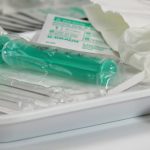Residents Demand Safe Injecting Facility

The Melbourne suburbs of North Richmond and Abbotsford have long been the site of an extensive street drug market. And with it come the harms associated with an unregulated and criminalised drug trade.
Between 2009 and 2015, there were 96 drug-related deaths recorded in the local area. In 2015 alone, there were 34. And although the figures for 2016 have not yet been released, locals fear there was an increase in the fatality rate.
The impact of the current regime extends well beyond harm to users. North Richmond needle and syringe programs are handing out 70,000 syringes a month. And while this is preventing the spread of blood-borne viruses, the injecting equipment is being discarded on the streets where users frequent and in many cases live.
On 27 August, around 700 residents took to the streets in North Richmond calling on the state government to reconsider establishing a safe injecting facility. Back in February this year, Victorian premier Daniel Andrews was adamant that such a facility would not go ahead.
It’s a health issue
The protest was organised by Residents for Victoria Street Drug Solutions: a group providing a voice for residents regarding the impacts of public drug use, and to educate the community on the benefits of medically supervised injecting centres.
Kylie Troy-West is a founding member of the group. She said that the Andrews government seems reluctant to establish a safe injecting room as it’s taken “a hard on crime approach” and such a facility “doesn’t really fit into that narrative.”
“It’s quite simplistic to see something like heroin addiction as a law and order issue,” Ms Troy-West told Sydney Criminal Lawyers®, “when you look at the research into addiction of this kind and the sort of trauma that is related to it.”
According to Ms Troy-West the safe injecting facility is a “no brainer,” but it seems that the government is set on taking a “drugs are bad” approach. And she questions why it wouldn’t want to “assist people in their time of need,” rather than leaving them in a vulnerable position.
The Patten bill
However, there is a push from within parliament for this evidence-based harm reduction approach. Victorian Sex Party MLC Fiona Patten introduced the Pilot Medically Supervised Injecting Centre Bill 2017 into parliament on February 8.
The private member’s bill calls for an 18 month trial of a safe injecting facility, with the aim of reducing drug overdoses, preventing the further spread of blood-borne diseases, as well as improving the amenity of the local community.
Former Victorian premier Jeff Kennett expressed his support for this latest push for a safe injecting room. Forty five community groups spoke out in favour of it. And both the Victorian Australian Medical Association and the Pharmacy Guild support the trial.
At the time the bill was introduced, premier Andrews said that his government recognised there was a problem, but the proposal wouldn’t go ahead. He explained that there were other harm reduction options, but declined to outline what these were.
On February 22, the Legislative Council referred the injecting centre bill to a parliamentary inquiry. Its report is set to be tabled in the coming days. After last week’s protest, Mr Andrews said that his government was waiting to have a close look at the document.
Reduced harms in the Cross
Mr Kennett became a vocal advocate for a safe injecting facility in Melbourne, after he visited the Uniting Medically Supervised Injecting Centre (MSIC) in Sydney’s Kings Cross in early 2015. The former premier said the facility benefits those suffering mental illness and homelessness.
The first of its kind in the English-speaking world, the MSIC was opened in May 2001, at a time when the Kings Cross area was facing a high concentration of overdose deaths, much like Richmond is today.
By 2011, ambulance call-outs in the Cross were down by 80 percent, the amount of publicly discarded injecting equipment and reports of public injecting had halved. Robbery and property offences in the local area had fallen, and there was no increase in drug offences.
During its time in operation, the MSIC has prevented over 6,000 potentially fatal overdoses. And as medical director of the facility Dr Marianne Jauncey has pointed out, there’s never been a fatal overdose at any of the 90-odd safe injecting facilities around the world.
The centre also acts as an important gateway to other drug treatments and health and mental welfare services for some of society’s most marginalised people, who would otherwise not come into contact with such services.
Former NSW premier Bob Carr said at his retirement that the establishment of the centre was one of his ten greatest achievements in office. So perhaps politicians south of the border might want to take that on-board.
City of Yarra voted yes
Locals have been campaigning for a safe injecting room in North Richmond for over a decade. In May 2011, the City of Yarra council voted six to one in favour of trialling a supervised injecting room. However, then state premier Ted Baillieu rejected the idea.
Greg Denham, a representative of Law Enforcement Against Prohibition, said in January that despite the support of the local council and community groups, the safe injecting room will never get off the ground without the support of the state government.
The former Victorian police senior sergeant pointed out that the state government needs to make legislative changes around how police would respond in the vicinity of the safe injecting room in the same way the NSW government did in regards to the Kings Cross centre.
A benefit for all
For residents like Ms Troy-West the impact of the open drug scene is taking its toll. “We will regularly walk past people sitting in between parked cars injecting,” she said, adding that syringes and other drug paraphernalia litter the streets.
“The reality is this has been a drug hotspot for a really long time. The activity that is happening here is happening in public. People are dying in the streets.” Ms Troy-West concluded. “That’s pretty traumatic for the people who live here and the users.”








